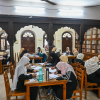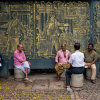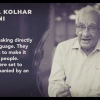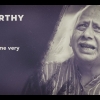Subha Chakraborty Dasgupta: I was doing English Literature at Lady Brabourne College and I was not nearly satisfied. I was satisfied with what I was doing but I wanted to do something else, I wanted to engage with my literatures. I wanted to read Rabindranath, and read not just Rabindranath. I wanted to read modern poets. I was missing out on something when I was doing English Literature. Although I did learn a lot. I enjoyed doing English Literature a great deal, and I think my foundation was good. I got to know how to engage with literature, how to read literature. So these things were very productive and at the same time I wanted something else. And there was something else that happened. A year before that, the principal of Loreto, Sister May, had enrolled herself as a student of Comparative Literature. So we actually came to know of Comparative Literature because of Sister May. And so we went to see what it was all about, we went to talk to the head of the department, Professor Naresh Guha, who dissuaded us from joining the department. He said, No you shouldn’t come here, there is no future in this. So, do English Literature. Later, I realised he was serious about what he was saying, not because there was no future but because he was of the opinion that maybe Comparative Literature was not meant for all. Maybe he had in mind a group of people who would be writing, who would devote themselves to activities. We realised that somewhere there was this feeling. Because later as well he did say that Comparative Literature was not for all. I mean he didn’t want it to expand. And therefore we didn’t have any faculty position for many years. But then again you know it is true this is safer and easier than in many parts of the country. People don’t have departments if there are no job facilities. Even today whenever we have teams coming to visit us, we have the UGC, we have the fund-granting bodies, we are asked about what our students are doing, what will they do when they pass out? So if there is no future why should the government waste its money? I mean if there is no possibility of a job or future positions. So I think in his own way Naresh Guha was right. Let this be a department, let this be a unique kind of place with few teachers and few students.
It was really a department where there was a lot of emphasis on reading literature, on poetry, on Bengali, and Sanskrit literature. I think the idea was to nurture a kind of creativity. And that because later again when I spoke to Naresh Guha, much later, talking about present days and about what we were doing, I felt that he was not very happy. He didn’t see why we were doing so much. I did think that perhaps we were not looking into literature the way they were looking at literature. I mean there were all the texts, but we were not really taking in as much literature. We were not really involved with the creative aspects of Comparative Literature. We were more interested in theory, to tell the truth. But of course I do feel, and I always felt that Comparative Literature, you know the kind of literature that we were exposed to, so much literature, and so many different kinds of literature that itself had an impact. I think students too, over the years students did, students do, did feel, did talk about their exposure. And the rich experiences they had. As they were exposed to certain kinds of texts.
Q.: Ma’am, two aspects you raised, one is Comparative Literature’s connection with creativity, and in the first two three decades all the familiar names of Comparative Literature that we see are poets or creative artists. Then from the '80s, perhaps when you joined the discipline, we see this pull towards theory, and I once read an article by Swapan Majumdar where he says that Naresh Guha didn’t like this going away from Wellek-ism. The kind of attitude towards literature that came from René Wellek and Austin Warren, he didn’t like this. This is what Swapan Majumdar said once. How do you respond to that?
S.C.D.: Well, I think it was in general, I mean theory was not any particular theorist-influenced. I would say that doing theory did not mean that you were not doing literature. Doing theory would not mean that you were not 'enjoying literary texts'. Doing theory helped us more to enter literary texts, perhaps in many different ways. And perhaps enrich our experiences with literature. And for me theory was always a way to respond to literature in a particular fashion. So there was this, but it’s difficult to say, I think that all over the world we have talked about what we are doing in class, and perhaps that would give us an idea what we are doing while we are doing Comparative Literature. All this talk about method vs. literary texts, method vs. creativity ... method vs. form... Method vs. chaos perhaps? That chaos is important. And as per method I think that when you’re doing research, when you’re involved in looking at something, the method evolves from your subject. So there is no set method as such. And of course you can say that Comparative Literature because it is Comparative Literature you are not the only thing, that you can say perhaps your perspective has to be as large as possible. Looking at interactions as well.
Q.: How did this shift in the late '80s overlap with trends in other parts of the world? As you were talking I was reminded about this book by Mario Vargas Llosa, The Bad Girl, where the central character—and he’s living in Paris—is saying that in the '60s or early '70s we used to hear about Sartre, Camus, and all the writers who are actively engaged with the literary as well as extra-literary reality. And then from the '70s onwards we only get to hear names like Derrida, and Barthes and all the post-structuralists, who were coming up. And he says that I find it extremely boring, because a writers’ engagement with reality is bound to be different from the theorists’ engagement with reality. So, was it a similar kind of situation here?
S.C.D.: No, I don’t think so, I think that this is again an oversimplification. I wouldn’t actually say that, I mean in the sense that Derrida is as much engagiée as any other person. As perhaps Camus, Sartre in a different way. It was because of Derrida, well keeping that aside. I still read Barthes as literature, and I often feel that if he was not writing literature he was perhaps moving from one subject to another constantly and from one position to another sometimes. Because he was constantly exploring, and exploring as a creative person. So, theory demands creativity. Perhaps one can look at theory as creativity, but then again not always. Mario Vargas Llosa himself, some of his texts can border on history, creative writing. One can extract theory from what he’s writing. For instance he’s writing politically as well. But, I think we were just following trends all over the world. And because a particular kind of theory had become important. It’s unfortunate that we don't, that we didn’t dig deeply into what our texts had to offer. That’s what we were trying, actually, that’s what we wanted to do. And we started doing Comparative Literature. Well, that was there somewhere. And we didn’t have the occasion to spell it out, because our university system is such that you have to engage with so many things, realities, so Comparative Literature, in the '70s, in the '80s, it did not have an easy time. There were often efforts to remove the discipline, remove the subject and remove the department, to close down the department. All this actually we encountered. And then there was this instance about students not getting jobs, though I don’t see why there is this issue, because students from many other departments also don’t get jobs. For literature students, it is difficult to get jobs. But of course that’s an incomplete question. So I think what we were doing, when your university is such an institution, when you are a part of other such institutions there is this small network. One isn’t really totally out of these networks, one is doing what perhaps is being done in other parts of the world. Not consciously, the interactions, these structures don’t change with what is happening. They don’t change. Not in all parts of the world, but some parts of the world. I think that Comparative Literature has always been absolutely socially relevant, in the sense I think doing literature is socially relevant. You are not able to see the results but without literature, without the humanities, man doesn’t have a future. I think maybe I’m quoting, it’s a very general statement. At various points of course you move through the times, I mean you have different ideas at different times. I think this point of creativity is very important. It is important to think of fresh energy. It’s very difficult to talk about creativity otherwise, I feel that we have that right from Rabindranath, he’s talking about creativity all the time, in education, his entire system of education is based on triggering creative aspects. I think Comparative Literature does that in a very powerful way, but I think what he does is also, I could talk about so many things with my students ... that you can think about collecting stories. Stories told by ganja addicts, and this is mainly ‘Gajakhorder golpo’. We’ve been doing a lot of things, I’m happy that you know that it just happened. I could do, I have the opportunity to do what I wanted to do. Even saying oral texts was taboo. Not taboo, but oral texts didn’t have any kind of importance, there was a lot of resistance, and people just wouldn’t let you do anything that had to do with orality. It was not authentic, there were so many arguments against doing oral texts. We managed to do the first phase of the CAS, we managed to. We managed to bring out audio cassettes, link ourselves to communities, with grassroots singers and people, and managed to work together, we went to them, and we didn’t bring them over. And we tried to be a part of that community and whatever was possible. The feeling is, these oral texts were read in order to look at how the language has changed for various reasons. Related to language, related to modes of narrative, related to stories, related to mindsets, etc. But to link it with the reality with the present, and to still see it happening, what it means to them, to sing these songs, how it’s related, how it is a part of the community, how it sustains the community, whether it sustains the community or whether it creates... What does it do to the community? And so, these questions, what do you do? This is still a question. Or the fact that it is Comparative Literature that can go there. It is Comparative Literature that can take you there. The question remains, then what? That is still a question. I’m not sure, but I think there is this uncertainty that characterises it, this uncertainty is also important perhaps. So it has been for me a rich experience doing Comparative Literature, dealing with Comparative Literature. A struggle, a great struggle, with myself. I think that is true, I mean that would have been true perhaps in many other cases as well. And struggle in the sense you are pulled toward so many directions.
Q.: Basically what we were discussing, you hesitated at one point, you said that this is only possible for Comparative Literature to do. But on the other hand you also perhaps agree that the Indian language disciplines which are in existence which can help us in some way also. Because they have certain resources, resources related to language and other things which may also foster a kind of relationship with the Indian language discipline.
S.C.D.: Yes, I think we need to do that a lot more, enter into relationships with Indian language departments and we will both benefit: the Indian literature departments, grounded as they are in reality, and also because reality itself is so varied. Sisir da would say that I’m a teacher of Comparative Literature because I’m a teacher of Bangla Sahitya. So he didn’t write it anywhere, but he would say this, I think that is right. But again I think we need to keep reaching out, that is important. And the other thing that I feel constantly is that while doing Indian literature you are necessarily forced to look at other literatures because the moment you try to look at deeply at any event, you see that there are interactions, different kinds of interactions, with not just literatures from different areas. So, it’s very difficult to draw a line, and nonetheless Comparative Literature as a discipline has its own course to follow. That too needs to be addressed in a different manner, in a larger fashion. Larger sections of interconnections, looking at larger currents and I mean both have a large view and a telescopic view, microscopic view. The task of a comparatist is really different. I mean it is really challenging. I think it has to be a collaborative enterprise. And it is something that we’ve been saying, but it is not easy to collaborate, but I think in today’s world, perhaps it is easy. You know even doing Indian literature, it is important to collaborate, as you said, it is important to collaborate not just with literature departments but with departments of history, philosophy. And work that will eventually benefit, or lead to some kind of change, benefit is the wrong word perhaps. When these things are concerned there comes the answer, the larger social perspective comes. The future comes in. It is very difficult to gamble. People need to decide on what’s right and what’s wrong, and what exactly the right stuff is, so that the future is different, it’s a better future. So these are some of the most important things. Like trying to question like what is the task. CL is to face other questions, like what literatures to choose to teach. So Comparative Literature changes with time, now you say evolves, but I don’t know. It definitely changes with time. I think usually in keeping with the times, but I think there has to be something else also. We know what we should do when we are doing Comparative Literature. Even there we need to choose small segments and of course it also means our areas of interest, but perhaps here we should be speaking to the world again. I look at interests, I look at what is happening in the world. We cannot work in isolation. At one point of time it was not possible to go out or be in touch with people but now it is possible. In touch with what is happening around, not that it should be the determining factor. Eventually we will, we’re always doing this, we have chosen our own areas for ourselves. It would be good to do that I think, but there are certain issues that are to be addressed. And so we have to do things, I don’t think it is possible, I used to think that we will, but how will you present it to the world? There are so many, and the market is such a dominating factor. You write a book which will not get anywhere, nobody will be able to see that book. You know books that are published here, they don’t get there. And seldom will a book by a real scholar, unless you’re also teaching somewhere else, be seen on a platform as a book, you know, as a separate entity, as a part of a general text, you know an essay that you contribute to, it has its own value. The Comparative Literature Association CLAI, ICLA, is all about where we find voices and other voices. How can you make the world hear what you’re saying, read what you’re writing? These are questions that we still have to address.
Q.: Ma’am, you have already raised too many points, but I have three related questions actually. One is how central do you think the role of Indian Literature is for Comparative Literature in India, and I was discussing this with a friend from another discipline who came to our department to attend a seminar. And he said, All that is fine, I have often noticed that you people talk a lot in terms of what you should do, rather than what you have already done or what you are doing now. And in that same seminar when we were defending the case for Comparative Literature, Comparative Indian Literature, one of the very senior scholars said that it is a very reductionist kind of attitude that one should read only Indian literature and nothing else. The argument follows from there that since we have already moved to the age of new media, the traditional concept of literature is gradually disintegrating and the time is going to arrive soon enough when literature as we know today will cease to exist, so Comparative Literature should address that and move towards another direction that will not remain Comparative Literature anymore but become Comparative Cultural Studies or become a sort of digital humanities. So how do you respond to these new predictions?
S.C.D.: Yes, there were several questions, one thing is that Indian literature is central to any of the departments of Comparative Literature in India, a large number of departments. I’m not saying doing Indian Literature means you are somehow doing Comparative Literature. Even otherwise, the meaning of Comparative Literature from many departments is doing Indian Literature. But again what does doing Indian Literature mean? Of course there are interactions, there are currents from many directions. So you just touch on one thing and you have so many other cultures interacting, so many other literatures' interaction. So that’s how I would try to address this issue, of course the whole idea of Comparative Literature is definitely what to map, these boundaries. And I would argue about this a lot, but now I feel that we’ve done so little, we’ve not really engaged with our literatures in a more meaningful manner. One of my students asked why you don’t do more by focusing on Indian literature and one of my students asked why we don’t have Indian literature as area studies. So I think students also felt that. Delhi University has been doing a lot of work, substantial work. You know where it’s showing, different heritages, different traditions which have existed which have come into India. Multilingualism, multiculturalism. And linking the world of the scripted with that of performance which has been a very important area in doing Indian literature. So there are so many things to do, there are so many things left for us and new media, yes new media is important and doing Comparative Literature means doing Cultural Studies. What are we doing if not looking at texts from other cultures, we have to enter into the domain of cultural studies. Culture studies again has certain connotations and going back to the early days of culture studies and what it meant would mean sort of breaking down the doors and windows of the university. And allowing in people from other walks of life. So there are different kinds of cultural studies and I always felt that. And Comparative Literature can have a very important role to play there. One doesn’t have to choose one from the other in research. As far as new media is concerned definitely we have to think about the meaning of literature today, how literature is changing into new media. The different elements that are coming in, now our entire perceptions are changing, how we are reacting to literature. Of course literature’s not going to come to an end, I mean literature is not going to die. That’s not the point, the point is that something new has come. It is like the printer. We’ve been saying this for a long period of time, but I think Comparative Literature is very important, if we are thinking in terms of the digital humanities, it has the potential to determine the course of humanities.
Q.: From my limited understanding, in the early days of culture studies in Birmingham, it had a very strong class dimension to it and all the Marxists came to teach there, then when it travelled to the United States again identity politics became very important there, in some way or other. Then when it is received in India, mainly by the English departments it is used as I think an apologia for their inability to connect with their own culture. That they start incorporating many Indian literatures in their own syllabi but not by giving them sufficient importance, but just add-ons to their own syllabi. So in that case, when Comparative Literature engages with cultural studies how should the attitude be?
S.C.D.: No, I don’t think that English literature’s really doing that, and Comparative Literature may also be doing that, just following the trends of cultural studies taught elsewhere. And the task is very difficult. What should we do when we are doing cultural studies? So even with Comparative Literature, there are one or two good courses. But then again could we do it in a different way? I mean some English departments, Susie Tharu’s department for instance, she had a whole agenda for cultural studies, linked with English Literature. So you know with English, as comparatists, we should have a broader perspective. We have to have dialogues with all. Comparative Literature always has this kind of holier-than-thou attitude which is really bad, which I think goes fundamentally against the emotion or the mindset, the philosophy of the discipline.
Q.: Ma’am, since you are speaking about Comparative Literature being a collaborative effort, how would you respond to Area Studies being inculcated in the discipline? As an isolating phenomenon? Where you have Bangladeshi Literature, as well as Latin American Literature, African Literatures which are being studied.
S.C.D.: A very important scholar once said—it was like an argument that we were having in a syllabus meeting—and he said that it was brothers talking about dividing the land among themselves. I think that’s what has happened. As I said we’ve lost focus. Area Studies, we could be doing, we don’t have to do Area, it could be incorporated into what we are doing in Area Studies. You know we are sort of losing focus, but we have not really entered very deeply into any large area. So there was, if you are so deeply involved with your language, you are a part of your reality. We were doing a lot of Sanskrit Literature, at one point of time Indian literature, we began doing Indian Literature in the '70s, but before that it was not possible, one had to have books, one had to have resources to be doing that literature. I mean the department had the resources to do those things. You know Bengalis have always been told—translate from other Indian languages. It was the same kind of criticism, but you know launched in a very scathing manner. I don’t think that’s true, even if we did not do Indian Literature we were not following any particular model, we had our own model. We had a lot of Sanskrit, we had a lot of maybe Bengali literature, we had a lot of European literature, but doing European literature in India from Indian perspectives often I mean, Naresh Guha and his involvement with Yeats. I think that was a very Indian kind of involvement. Comparative Literature was then practised in the South, A compared A, A comparing A and B, hundreds and hundreds of PhDs and Comparative Literature was being discouraged for this. This comparison between A and B, this text A and text B, Eliot and someone from Indian literature. But on the other hand there was the wisdom of those who questioned, who did ask these questions…
Q.: Ma’am, this is the last question that we will be asking, Comparative Literature nowadays enjoy an almost unprecedented visibility in the whole country. Because whenever we go outside West Bengal, people somehow seem to be familiar with Comparative Literature.
S.C.D.: Yes, visibility yes, they know that there is something like Comparative Literature. Also, Comparative Literature, Well what do you teach? To the general man on the street, what is Comparative Literature? One very positive thing that I have noticed in the German studies discipline in India, we have been going there for the last three years. And they told me what their motive was they said that doing any kind of foreign studies in India is a comparative exercise. That when our students come, we teach them the language for three years, we can’t enter the literature so easily so what we do is we try to know from them what literatures they are aware of and we try to give them the method and things like that from their own understanding of literature and the literature they have read. So how would the institutional practice of Comparative Literature respond to these things that are happening outside our boundaries?
I think they are important, and I think we should engage with them as much as possible, whatever we can, this has been happening all the time at JNU also, Russian studies has a course on Comparative Literature, many of these foreign language departments have course on Comparative Literature, one or two course on CL. So CL is a part of, but again, that is not CL, but full-fledged departments have other objectives, it should have other objectives. Very set objectives. I mean on the one hand there can be a lot of open spaces, I don’t mean that we need to close frontiers, but then there has to be … this can be research and teaching, maybe what is being researched has to correspond with the syllabus I mean has to come down to the syllabus. But then what is necessary is at the level of research you need to do some really solid work related to Comparative Literature. And with a very large perspective and only then can you tell people that look this is what we’ve done. You know this is what have you done with history what have you done with historians? These are questions… 'Jadavpur ne kya kiya', Namvar Singh asked. So, we don’t have to have that kind of comparatism, we just need to work. We just need to do some kind solid work, and not in a negative manner. They are not doing this, they are not, we are doing the right thing, etc. Just do, whatever, you can, just work, that’s what is necessary, for Comparative literature to become Comparative Literature. And not just Comparative Literature also, do some solid work and any solid work gets noticed. What happens elsewhere is also a point, we have the opportunity. We have a lot of opportunity to showcase—not to showcase, to tell people what we are doing.











